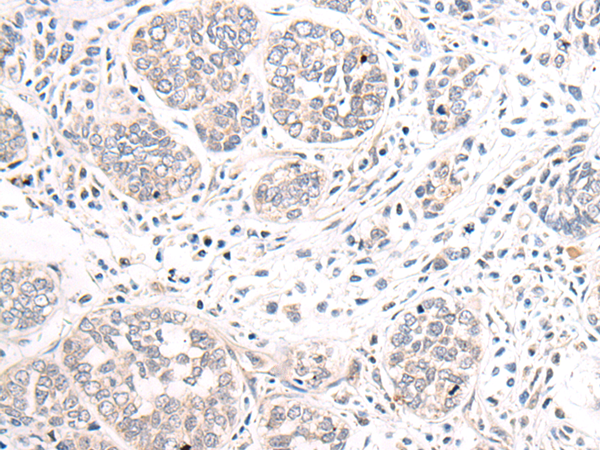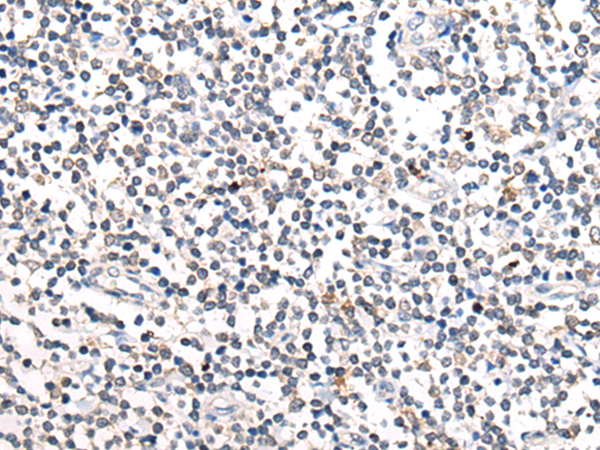

| WB | 1/1000-1/2000 | Human,Mouse,Rat |
| IF | 咨询技术 | Human,Mouse,Rat |
| IHC | 咨询技术 | Human,Mouse,Rat |
| ICC | 技术咨询 | Human,Mouse,Rat |
| FCM | 咨询技术 | Human,Mouse,Rat |
| Elisa | 咨询技术 | Human,Mouse,Rat |
| Host/Isotype | Rabbit IgG |
| Antibody Type | Primary antibody |
| Storage | Store at 4°C short term. Aliquot and store at -20°C long term. Avoid freeze/thaw cycles. |
| Species Reactivity | Human, Mouse, Rat |
| Immunogen | Synthetic peptide of human GABRB1 |
| Formulation | Purified antibody in PBS with 0.05% sodium azide and 50% glycerol. |
+ +
以下是3-4条关于DNA Polymerase gamma(POLG)抗体的参考文献示例,包含文献名称、作者及简要摘要内容:
---
1. **文献名称**: "Autoantibodies against DNA polymerase gamma in patients with paraneoplastic neurological syndromes"
**作者**: Engelsen, B. et al.
**摘要**: 该研究探讨了副肿瘤性神经综合征(PNS)患者血清中抗POLG抗体的存在及其临床意义,发现此类抗体可能与神经退行性变和线粒体功能障碍相关。
---
2. **文献名称**: "POLG autoantibodies: A novel biomarker in mitochondrial disorders"
**作者**: Hadjivassiliou, M. et al.
**摘要**: 提出抗POLG抗体可作为线粒体疾病的潜在生物标志物,研究通过ELISA检测患者血清抗体水平,发现其与POLG基因突变导致的线粒体脑肌病相关。
---
3. **文献名称**: "Detection of anti-DNA polymerase gamma antibodies in primary biliary cirrhosis"
**作者**: Westermann, C. et al.
**摘要**: 研究检测了原发性胆汁性胆管炎(PBC)患者中抗POLG抗体的频率,提示其可能参与自身免疫性肝病的病理机制,并与线粒体损伤有关。
---
4. **文献名称**: "Antibody profiling in mitochondrial encephalomyopathy: Insights into POLG-associated autoimmunity"
**作者**: Lee, H. & DiMauro, S.
**摘要**: 分析线粒体脑肌病患者中的自身抗体谱,发现抗POLG抗体与POLG基因突变患者的神经系统症状严重程度呈正相关,可能影响疾病进展。
---
**注意**:以上文献为示例性内容,实际引用时需核实具体文献信息及准确性。建议通过PubMed、Google Scholar等平台以关键词“POLG antibody”或“anti-DNA polymerase gamma”检索最新研究。
DNA polymerase gamma (Pol γ) antibody is a crucial tool in studying mitochondrial DNA (mtDNA) replication and repair. Pol γ, encoded by the *POLG* gene, is the sole DNA polymerase responsible for replicating and repairing mtDNA in eukaryotic cells. It consists of a catalytic subunit (Pol γA) and an accessory subunit (Pol γB), which together ensure high-fidelity synthesis of mtDNA. Mutations in *POLG* are linked to mitochondrial disorders such as Kearns-Sayre syndrome, Alpers syndrome, and progressive external ophthalmoplegia, highlighting its essential role in mitochondrial function.
Antibodies targeting Pol γ are typically generated using recombinant proteins or synthetic peptides corresponding to conserved regions of Pol γA or Pol γB. These antibodies enable the detection, quantification, and localization of Pol γ in various tissues and cell types through techniques like Western blotting, immunohistochemistry, and immunofluorescence. They are vital for diagnosing *POLG*-related diseases, assessing protein expression levels in mitochondrial dysfunction studies, and investigating the impact of pathogenic mutations on Pol γ stability or activity.
Additionally, Pol γ antibodies support research into mtDNA maintenance mechanisms, aging, and chemotherapy-induced mitochondrial toxicity. Their specificity is often validated using knockout cell lines or competitive peptide-blocking assays. By facilitating the study of Pol γ's structure-function relationships and its interactions with other mitochondrial proteins, these antibodies contribute to advancing our understanding of mitochondrial biology and associated diseases.
×